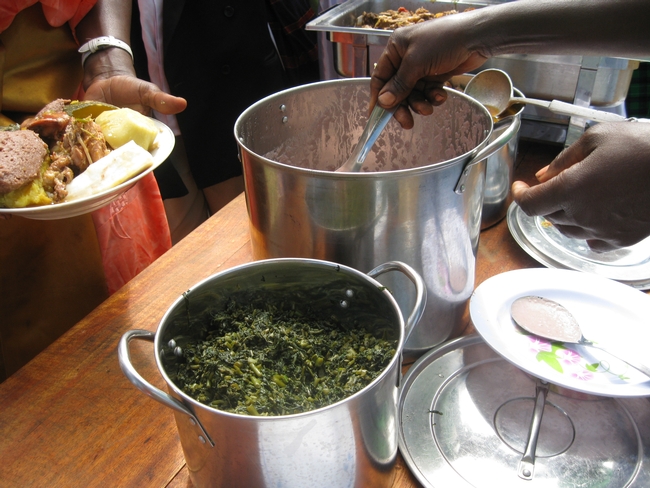- Author: Brenda Dawson
What will be the new food frontier? An article in the Wall Street Journal with the headline “Next Stop for Food Fanatics: Africa” predicts adventurous American palates may soon be craving sub-Saharan cuisines.

Have you heard of these?
- Nakati (Solanum macrocarpon, S. aethiopicum) Also called African eggplant, some types of nakati are eaten for their leafy greens, while others are eaten for their fruit (which can look like a tomato or eggplant).
- Cowpea leaves (Vigna unguiculata) This plant produces black-eyed peas, but the greens of the plant can also be eaten as a vegetable.
- Bbuga (Amaranthus Gracecizans) You might know this plant by its common American name: pigweed.
- Doodo (Amaranthus Dubius) Like bbuga, this type of amaranth is eaten for its leaves in many parts of Africa. In North and South America, varieties of amaranth are usually used as a grain.
- Jjobyo (Gynandropsis Gynandra, Cleome gynandra) Also called spider plant.
Many of these indigenous vegetables are rich in micronutrients such as iron, vitamin A and vitamin B. When it comes to alleviating malnutrition in developing countries of eastern Africa, indigenous vegetables offer workable solutions because they are not only nutritious, but also familiar to the region’s eaters and farmers.

Recently U.S. researchers have been working with indigenous crops like these in east African countries — with funding and support from the Horticulture Collaborative Research Support Program (Horticulture CRSP), led by Beth Mitcham at UC Davis with funding from USAID. In Kenya, Tanzania and Zambia, Stephen Weller of Purdue University is leading a Horticulture CRSP research project on production practices, seed resources, postharvest handling, marketing and nutrition of varieties of amaranth, spider plant and African nightshade.
In Uganda, Kate Scow of UC Davis is partnering with local groups to try out a new model of extension while increasing production of indigenous greens, such as nakati, bbuga and jjobyo.
Take a look at this short video for a little more background:
Just as bok choy, an Asian vegetable, has become familiar to many American households, perhaps one day you’ll find nakati or another African leafy vegetable on your plate.
In the meantime, researchers with Horticulture CRSP are working to get more African leafy vegetables into the research agendas, fields, markets and plates of our counterparts in eastern Africa.
Read more abut Horticulture CRSP and its projects around the world at http://hortcrsp.ucdavis.edu.




One thing to keep in mind is that these vegetables are called many different common names (some of the ones used here are more common in Uganda, for example). So finding seeds for them here in the U.S. would probably be easier when searching with the scientific names.
When it comes to eating the leaves of some of the plants that are already more familiar in the U.S., this website has some info to get you started about when to harvest and how to eat them: http://www.infonet-biovision.org/default/ovvImg/-1/crops Another useful website for growing your own might be: http://www.avrdc.org/index.php?id=431 Both of these resources are aimed at African growers, but I imagine they could also be helpful to American gardeners of these crops.
I'll ask around the office and see if anyone else has other ideas. It would be neat to start an indigenous African vegetable demo garden. Let us know if you find/plant some!
Though our program doesn't currently have funding opportunities, we do maintain a list of organizations and researchers who are seeking collaborations and other opportunities. You can look for partners and submit your information to be included on our list at http://hortcrsp.ucdavis.edu/main/find_partner.html Thanks again!